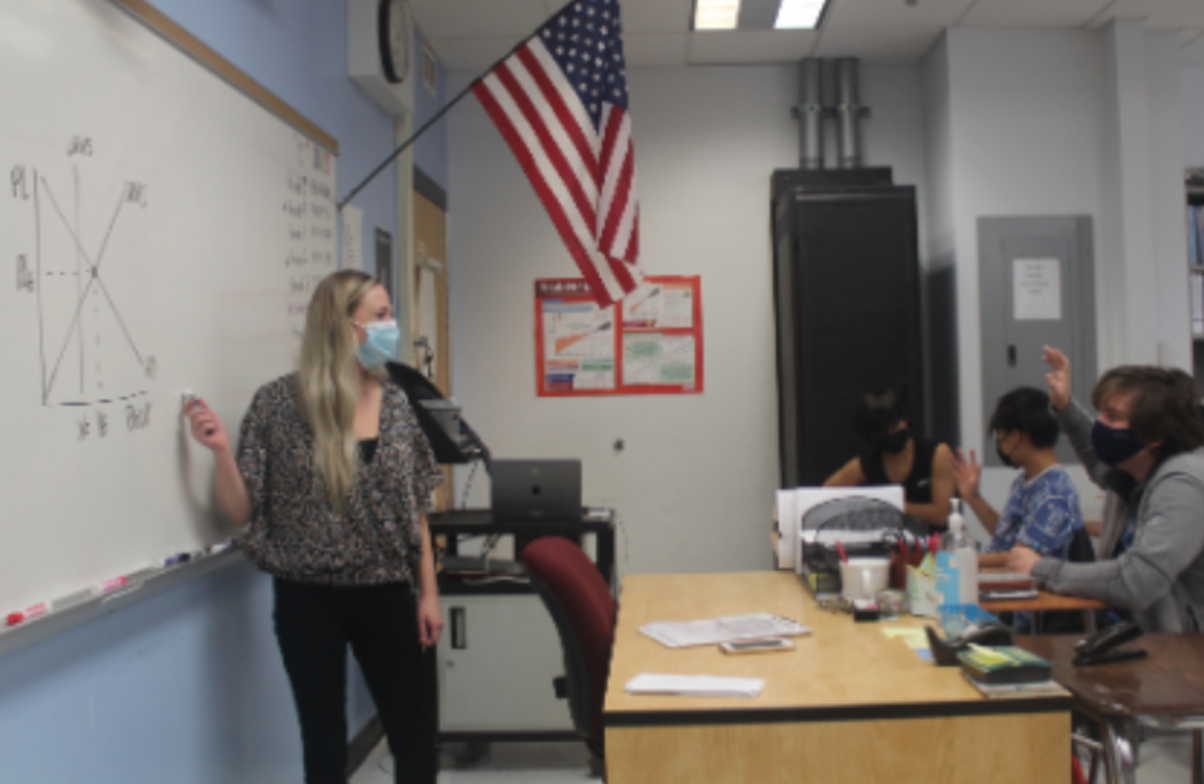PHS Profile: Katelyn Wagner shares her love for economics
November, 2021
Known by her students as “Ms. Swagner,” Katelyn Wagner has been teaching economics at PHS for three years. Before becoming a teacher, Wagner worked in marketing for a year before realizing she wanted to pursue an alternative route in the business field. Since she enjoyed marketing’s interactive and communicative aspects, she was drawn to teaching. Wagner’s own experience in education also inspired her to become a teacher. As she reflected on her past teachers, she realized she never had an educator who had deeply impacted her. This empowered Wagner’s aspiration to not only give students a memorable learning experience but also to be a supportive figure throughout high school.
“Maybe I can be a teacher that ... students remember and help them figure out what they want to do,” said Wagner. “I love teaching, [it’s] something new every day, and I get to talk to everybody. [It’s] a lot better than sitting in a cubicle.”
Wagner’s first teaching job was in the two courses Law and Honors Personal Finance at South Brunswick High School and later on, at both South and North Middletown High School. With backgrounds in finance, economics, and law, Wagner enjoys exploring the intersections of these three topics with her students.
“I like economics, because it is so closely related [to] law,” said Wagner. “If you understand economics, how the economy works, and making policies, [you can] use those policies to make things more fair [and] more equitable.”
Bringing her experiences to PHS, Wagner currently teaches AP Macroeconomics, AP Microeconomics, and the Advanced Contemporary Economics Issues elective. She assumed the role of economics teacher in the middle of the year after the departure of Lisa Bergman. With a short period of adjustment, Wagner described taking over Bergman’s position as one which came with challenges.
“It was hard. I mean, she was such a great teacher. To ... take over for somebody like that was intimidating,” said Wagner. “Also, never having taught economics, at least at the AP level before, was also difficult. But I mean, you kind of buckle down and you do the best you possibly can.”
After Wagner finally found a routine for class, the pandemic moved students to remote learning, and she had to adapt her lesson plans again. Many of the skills necessary in AP economics including graphing and creating data tables were a main concern with virtual learning. However, through platforms such as Kahoot, online whiteboards, and breakout rooms, Wagner gave her students the chance to collaboratively practice these skills in class.
“It’s definitely a lot of tweaking and adjusting and like, ‘How do I do this online?’ and ‘How do I make this something interesting online?’” said Wagner. “But we really made it work.”
When PHS returned to in-person learning again, Wagner was excited to incorporate engaging and interactive activities into her lessons again. She hopes that past students look back on her course fondly and that current students look forward to class.
“I try to make [class] challenging, but I don’t want it to be a subject or a course that students are afraid [of ] or intimidated by. I love economics, and I want students to love economics,” said Wagner. “I want to be more approachable and have a more hands-on [learning experience] and less intimidating environment.”
Some examples of these activities include scenario cards for classifying different types of unemployment in AP Macroeconomics, the paper chain demonstration to show the law of diminishing marginal returns in AP Microeconomics, and the egg drop project to simulate inequality and contemporary issues for Advanced Contemporary Economics Issues.
Zeynep Uzun ’22, a student in Advanced Contemporary Economics Issues, chose to continue studying economics as a result of her newfound interests after taking AP Macroeconomics and AP Microeconomics. She attributes part of her interest to Wagner’s teaching style and encouraging learning environment. “
She’s very friendly and approachable. She’ll pop in debates or conversations on an article and give us a pointer, like a new definition or something. And I think that’s really helpful,” Uzun said.
Towards the end of the year, Wagner also teaches topics such as filling out tax forms and student loans. She hopes that her students will take away skills beyond the curriculum.
“Obviously, I’m thrilled when students are interested in economics, but even if they’re not, if they could use [these skills] in their everyday life, I’m happy,” Wagner said.
In addition to being a teacher, Wagner is also the advisor for the National Economics Challenge club. During the pandemic, Wagner and the club held virtual mock competitions to prepare. Despite 2020 being their first year competing, the members of the club’s top team placed 12th in the state. It was a memorable and interesting experience for the students.
“Having students that are interested in economics and want to practice economics is awesome. [NEC] is a lot more fun and laid back approach to economics, versus in class, when we’re on a deadline,” Wagner said.
Outside of the classroom, Wagner loves spending time with her friends and family at the beach in Spring Lake, baking on weekends, and doing yoga. She also enjoys listening to live music and sharing her music with her classes through Pandora playlists.
At the end of the day, Wagner hopes that she can help students in some way, whether it’s related to economics or their personal lives.
“If I can help somebody out and make their [lives] a little bit better, or have something that they remember and will help them either in college or elsewhere, that’s my hope,” said Wagner. “It’s the smaller things that really matter.”